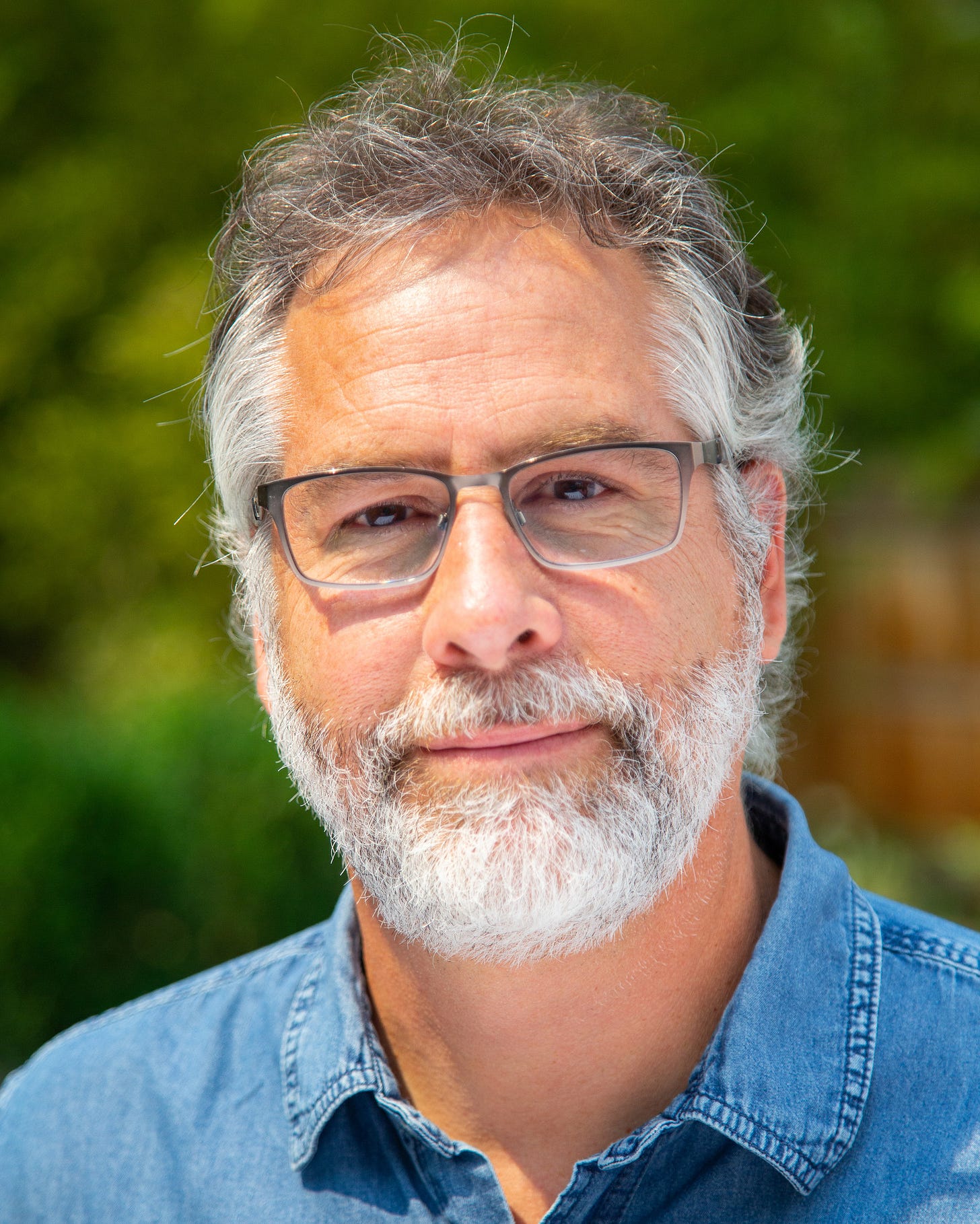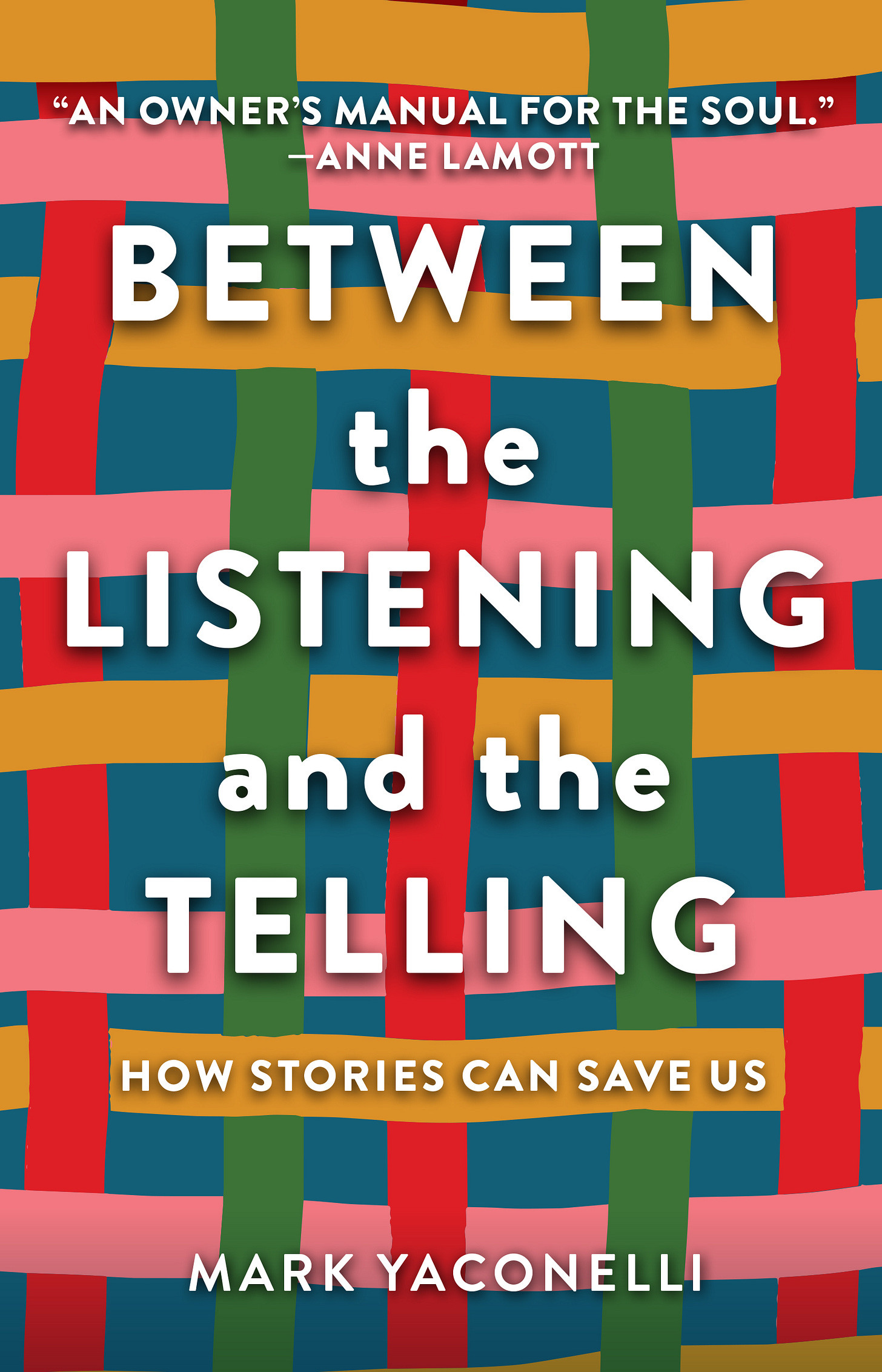The Door Interview: Mark Yaconelli
I first connected with Mark Yaconelli in 2007 when we were both speaking at Greenbelt UK. (Yes, Mark is the son of The Wittenburg Door founder Mike Yaconelli. And one of my favorite interviews was capturing Mike's magic for The Door, which unfortunately proved to be one of the last interviews he gave before he was killed in an automobile accident).
Fast forward to 2022 when I reconnected with Mark at a Portland brewpub. Since we first met, he's gone on to found the storytelling community The Hearth and wrote a book titled Between the Listening and the Telling. While chatting with him about a piece for Only Sky focusing on his work with storytelling communities, I decided to throw in a few Door specific Qs. Enjoy.
How would you describe your faith growing up?
I feel like I grew up with healthy religion in the sense that it was simple, humble. No one was paid. We kids and adults set up the space. We met in a rented grange hall. It was very human. People just showed up as they were—no dressing up, no pretention, nothing slick or formal. It really felt like we were all trying to use the Gospels as a lens to understand our lives. In a very basic way, it felt like a group of people really trying to be loving towards ourselves and others. It was also such a relief to be around people who had a sense of humor, people who didn't take themselves seriously. And it was a creative space. That was part of my Dad’s guidance. Encouraging us all to find creative ways to live out the Christian life. I feel like my life is still a struggle to live out those Christian values I learned from that church. Now my work is in mostly secular, nonprofit public spaces. But I still rely on those Christian practices I learned growing up. I just don't use Christian language in those settings, but the Gospel imperative is still there.
What did The Wittenburg Door mean to you during this time?
When The Wittenburg Door first came out, I was like five years old. So I grew up with the Door. Sometimes I would travel with my dad, and he'd do these interviews and it was really formative to watch my dad passionately talking to others about the Christian faith. But like everyone else, I had to sneak The Door. I'd take it out of my dad's office, take it down to my room, and kind of read these articles. I loved the humor, the cartoons-Dogs Who Know the Lord, The Green Weenie awards. I read the little trivia statements that were in the margins. It was a way for me to learn satire, learn humor and also get a healthy vision of the Christian faith. There was such a strong crap-detector in the Door. And that’s really a healthy instrument in religion—discerning he bullshit from the gold. The Door was at its best when it was trying to get clear about how life's just not capricious and meaningless by point to acts that bring life and meaning and I felt that as a kid.
How did you deal with growing up as a PK (preacher's kid)?
The way I was mostly exposed to my dad was the way he worked around town. That was a very small scale. He was a volunteer in our town and church. He ran a little youth group, took kids to Mexico to build houses, did funerals and weddings, counseled people, and gave money anonymously to different groups. As he was trying to serve his local community, he ran this church as a volunteer. He also was a prankster. He loved to write these crazy notes to the school when I was absent. School receptionists loved them. He’d write things like, “Please excuse Mark this afternoon, we received a new shipment of Columbian cocaine and need his help packaging for market.”
How did your dad's approach to ministry inform your work?
For the first five years in my nonprofit work, I was a volunteer doing exactly what my dad was doing. I was leading retreats and helping nonprofits, trying to find money for struggling people. I tried to serve the community in a way that I thought brought healing and empower those on the margins. I was very much following in my Dad’s footsteps.
A key difference is that your dad was leading a church, whereas you're leading a secular nonprofit.
I don't shy away from my Christian commitments and my Christian identity. If you saw the events I lead, you'd be able to identify elements of a Protestant worship service like testimony, silence, an offering, a homily, and even communion as we have wine and food in the middle of our events. So you would see it all there. I just don't use Christian language. I've been able to move between a lot of spaces and help a lot of people by providing a kind of spiritual grounding that a lot of people don't have--particularly in the nonprofit world.
My experience is God is not in many churches right now. I find God much more accessible in the community square. God shows up in the environmental movement, in racial justice movements-- and all these various liberation movements. What we need to do is be converted outside the church to those who are doing the work of God whether they call it that or not.
And what did you learn from your dad that helped inform your your storytelling and community building?
My dad had a commitment to staying alive. The most important thing I received from him is that you need to be a living person. Try to stay alive and awake to what's happening inside of you and within the world. He didn't really have patience when things felt deadening to him. The Christian faith was a recipe for staying alive. Jesus animated my father, called him to resist falling asleep. Jesus gave him vitality. I caught that energy from my Dad and it’s been an enormous gift—even though the struggle is difficult!
What advice would your dad give to us as we reopen The Door?
In my dad's day, The Door functioned like a court jester that critiqued the powers that be within the religious establishment using humor and satire. That was then.
My dad was not somebody who looked back. When he died, there wasn't much histology around. He didn't keep old pictures or anything like that very much. If he were alive today he would be moving on to the next thing, and be interested in whatever's new.
In terms of relaunching The Door, he'd recommend figuring out a new way to do it that fits the context that is applicable for trying to reach people today. Because we're now seeing over half of people do not consider themselves Christian. They might be spiritual, but they're not going to church anymore.
Meanwhile, you have nonprofits that are trying to do really serious justice work, but they're running off of anger and despair. They don't have a sense of humor about who they are, and yet they're doing the work that we all need to be doing right now. So I could see my dad finding a way to partner with those groups.
You know, my dad would say go out and live the truth, do it with love and passion, and have some fun. As soon as it becomes a burden, walk away from it and do something else.
Speaking of fun, your dad was known for having a "childlike sense of wonder." How do you get back to this childlike sense of wonder given the childish culture we seem to be living in?
It's all about going back into our bodies and being in the senses. Notice when our bodies tense up, when they love, when they're hungry, and what they need. It's getting into that simple sense of gratitude, delight, and connectedness. You know Jesus was embodied. He touched sick and hurting people. He washed feet. He hugged children. He opened ears. We live so much in our heads. Our bodies are so sedentary—bored. Pay attention to what your body needs and you get closer to that childhood self.




